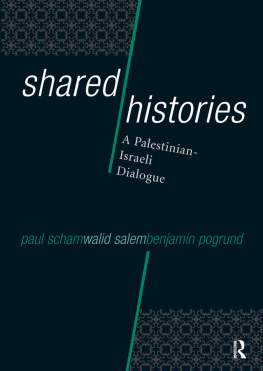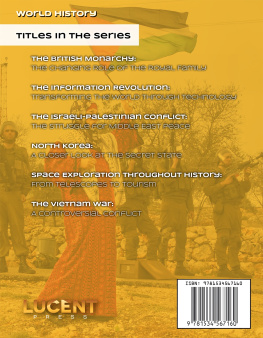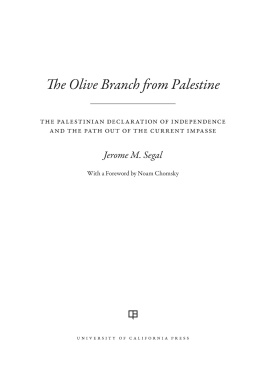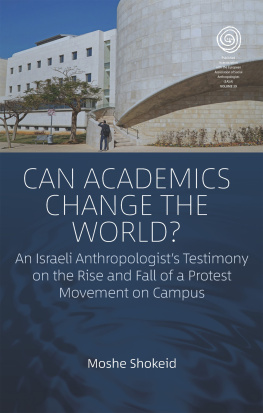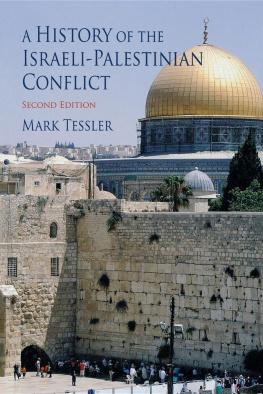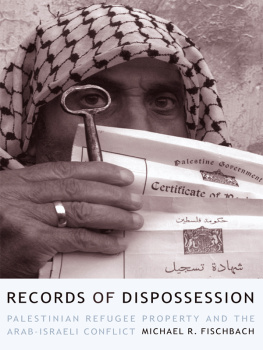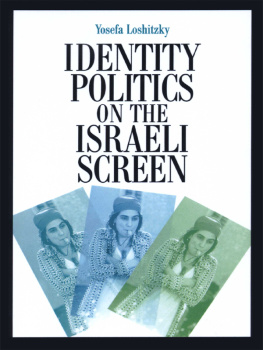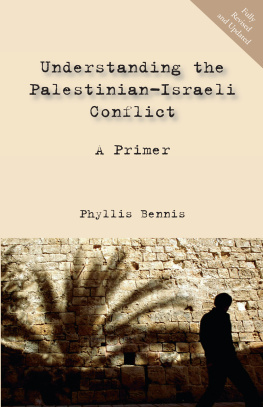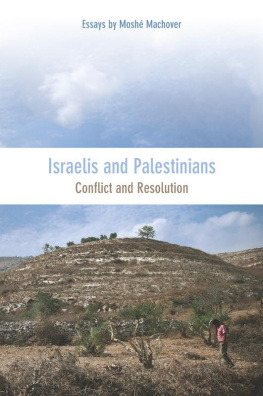SHARED HISTORIES
Shared Histories
A Palestinian-Israeli Dialogue
Editors
Paul Scham , Walid Salem , Benjamin Pogrund
Originally Published by the Palestinian Center for the Dissemination of Democracy & Community Development (Panorama) and the Yakar Center for Social Concern, 2005
First Published 2005 by Left Coast Press, Inc.
Published 2016 by Routledge
2 Park Square, Milton Park, Abingdon, Oxon OX14 4RN
711 Third Avenue, New York, NY 10017, USA
Routledge is an imprint of the Taylor & Francis Group, an informa business
Copyright 2005 by Paul Scham, Walid Salem, Benjamin Pogrund
All rights reserved. No part of this book may be reprinted or reproduced or utilised in any form or by any electronic, mechanical, or other means, now known or hereafter invented, including photocopying and recording, or in any information storage or retrieval system, without permission in writing from the publishers.
Notice:
Product or corporate names may be trademarks or registered trademarks, and are used only for identification and explanation without intent to infringe.
Library of Congress Control Number: 2005928677
ISBN 978-1-59874-013-4 paperback
Contents
| by Ruth Kark |
| by Adel Manna |
| led by Ruth Kark and Adel Manna |
| by Ran Aaronsohn |
| by Issam Nassar |
| led by Ran Aaronsohn and Ata Qaymar |
| by Manuel Hassassian |
| by Norman Rose |
| led by Manuel Hassassian and Norman Rose |
| by Dalia Ofer |
| by Ata Qaymari |
| led by Dalia Ofer and Ata Qaymari |
| by Moshe Ma'oz |
| by Walid Salem |
| led by Moshe Ma'oz and Walid Salem |
| by Avraham Sela |
| by Adel Yahya |
| led by Avraham Sela and Adel Yahya |
| by Moshe Amirav |
| by Salim Tamari |
| led by Moshe Amirav and Bernard Sabella |
SHARED HISTORIES is the title and leitmotiv of this book and of the project behind it. Thanks to the courageous, untiring, and persistent collaboration of Israelis and Palestinians, this project has been implemented over some years and I have had the honour and pleasure to be part of it.
In this conflict-ridden world and especially in that country that needs peace so desperately but that still seems to be so far removed from it, the commitment and the attitude of the Israeli and Palestinian authors and, above all, of the publishers, Benjamin Pogrund, Walid Salem and Paul Scham, are particularly note-worthy. I am filled with confidence that the descriptions of a specific period in the history of Palestine, which have previously been developed and discussed here and are now represented, will contribute to the process of ending the conflict, which is, hopefully, regaining momentum, and to the longed-for peace between Israelis and Palestinians.
Shared history is also common history endured together, which can simultaneously be the basis and point of departure of dialogue, respect, and understanding for the other side, in each case.
Rabbi Michael Rosen, head of the Yakar Center in Jerusalem, says: History is a means of self-understanding. Unless one is prepared to be self-critical and objective about oneself, there can be no real development. Without history one can neither understand oneself, nor the world around.
Furthermore, it is impossible without an understanding of history to discover the present or indeed to predict future developments. And history consists of narratives, in the first place. Here, too, various sources were selected, analyzed, interpreted, and finally published as narratives. In Palestine and Israel, in particular, there are very different points of view and evaluations of the historical facts.
By the nature of things, in the 100-year-long conflict between the Jewish and Palestinian populations, it is particularly difficult to acknowledge the history of the other partner to the conflict, in addition to ones own viewpoint and description of history, never mind accepting it as being of equal worth. That is why presenting factually honest historical descriptions from both sides of a given period is highly commendable, in the face of all the adversity that the conflict has generated in recent years.
History has involved both sides with their own particular stories in such a way that it is possible to talk of both a common and a shared history. The claim being made, in the project represented and in the contributions collected, is that it is a factually and politically honest search for a fair description of proved historical facts, which is both the basis of the understanding of the attitude of the other side in each case and an evaluation of it. Movements toward peace start with growing reciprocal knowledge. This knowledge alone produces self-knowledge and understanding of the point of view and attitude of the other side and only in this way will understanding finally be attained.
The Truth Commissions in South Africa or in Central America are good examples of the necessity of gaining comprehensive knowledge of the development; the actors and the victims in the conflicts, preparing the way for processes of understanding and for peace. The work of the German-French and German-Polish Schoolbook Commissions is another impressive demonstration of how historical narratives, analyzed and evaluated through dialogue, can contribute to understanding between peoples who were former war-time enemies.
As supporter and moderator, I have had the opportunity to accompany this project for part of the way, particularly at an important conference in Cyprus, and I share the conviction of the publishers and authors that peace is possible in Israel and Palestine and that the reciprocal propagation of the knowledge of the common, shared history will make quite a considerable contribution to it. In this respect, I wish for this publication to attract considerable attention and be widely distributed and I wish the project much continued success.
Burckhard Michael Blanke
Bonn, January 2005
WE would like to thank the generous financial benefactors who made this Shared Histories project possible: David and Elaine Potter and Michael Polonsky of the David and Elaine Potter Charitable Foundation in Britain who supported us from the start, and the Friedrich Naumann Foundation in Germany whose Jerusalem Director, Dr. Burckhard Michael Blanke, shepherded the project through his organization; we invited him, as a historian and impartial observer of the Middle East scene, to chair the discussion sessions which he did with authority and sensitivity. On his departure from his posting in Jerusalem, Anne Koehler, also from the Friedrich Naumann Foundation, ably took over. The current Director, Dr. Rene Klaff, has continued to give us unstinting support and it is through his efforts that the Friedrich Naumann Foundation has made this book possible. Suleiman Abu-Dayyeh at the Foundation has been a helpful friend throughout.
We thank Dima Bazbaz of Panorama for her constant help, Isabelle Klebanow for her accurate transcription of the discussions, Lama Habal for her assistance in editing, and Hannah Sholl for preparing the texts for printing. Paul Scham expresses his thanks to his current colleagues at the Middle East Institute and at George Washington University, both in Washington, D.C., for their support and encouragement in the long process of preparing this work for publication.

